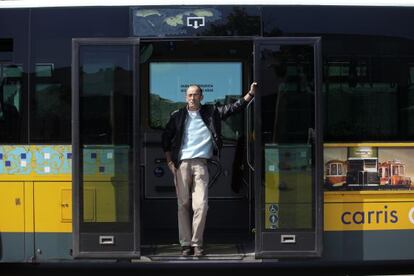What Portuguese workers did to alleviate the loss of a fair day’s wage
Bus drivers set up a food bank for colleagues who can no longer pay their way


From a small room that was once unoccupied at a bus company in Lisbon, union officials hand out basic foodstuffs such as canned sardines, jars of wieners, cartons of milk and packets of pasta. For the last few months, the bus drivers’ union has been collecting and donating food — not to give out to poor people but instead to distribute among themselves. Despite the fact that they have still have their jobs, many workers find they cannot keep their families fed by the end of the month.
The ongoing cuts in public workers’ wages across Portugal, tax hikes, and harsh austerity measures introduced by the conservative government of Prime Minister Pedro Passos Coelho are making it difficult for many to meet their basic expenditures. The purchasing power of Portugal’s middle class has dropped considerably, and families that emerged from poverty a decade or so ago are finding themselves returning to destitution.
Evaristo Paulo, 38, is a bus driver who puts in a 40-hour week. He has a six-year-old daughter. Some weeks back, his boss told the works committee that Evaristo was going hungry and they needed to help him out. They never knew why he didn’t come forward and ask for help in the first place; maybe because he was embarrassed or had no idea that packages of food were being handed out.
Evaristo, who has been on the Lisbon bus company payroll since 2007, was getting 1,100 euros a month two years back. But with cutbacks, his pay has dropped to 800 euros. The divorced Evaristo provides his daughter with child support and visits her twice a month. He lives with his mother some 150 kilometers from Lisbon. “I prefer not to eat rather than not to have gasoline to make the trip,” he says.
They come with their wives and children; it just breaks your heart”
Paulo Gonçalves, a member of the union, was the official who contacted Evaristo; so whenever he needs food he goes to the room from where the food bank operates.
The distribution was set up during Christmas after workers saw that many of their colleagues were going through tough times, Gonçalves explains. “There are some who have unemployed wives who cannot collect jobless benefits because they were never on a work contract in the first place. A lot of them worked in restaurants that are now closed or in stores that no longer have profits. I know some colleagues whose spouses were notified of their redundancy through an SMS message. This is the way things are in this country.”
Since Christmas, about 80 co-workers of about 2,000 on the payroll have asked for food. Every week, members of the union drive around in a truck to the different bus stations and garages where co-workers have left packages for the food bank, which is located in the empty room in the Santo Amaro neighborhood near the April 25 Bridge.
Bus drivers — as with other public employees — have seen their benefits shrink over the past few years, including the elimination of the two extra months’ salary and overtime pay mixed with higher withholdings from their paycheck. The result is that drivers have lost between 300 and 400 euros in monthly pay.
Two months ago, the Portuguese Constitutional Court ruled that the government could not pull workers’ extra months’ salary and now the Passos Coelho administration is studying ways to implement that ruling while keeping its austerity pledges to Brussels.
But neither Evaristo nor Gonçalves believe that the government will pay back all the months that it withheld. They believe that Finance Minister Vitor Gaspar will come up with a legal argument to prevent all workers from receiving back wages. At the same time, Passos Coelho has already announced a new package of austerity measures for the next three years.
As time passes and the situation worsens, Evaristo knows that more could find themselves in his situation.
“Sometimes we have to take food to co-workers’ homes because they are ashamed that their colleagues may see them asking for handouts. Others come with their wives and children and that just breaks your heart,” says Gonçalves, who pauses and thinks before continuing: “If we are working like we should, complying with our duties, but we can’t make ends meet to live with a little dignity, then tell me: what are we doing here?”
Tu suscripción se está usando en otro dispositivo
¿Quieres añadir otro usuario a tu suscripción?
Si continúas leyendo en este dispositivo, no se podrá leer en el otro.
FlechaTu suscripción se está usando en otro dispositivo y solo puedes acceder a EL PAÍS desde un dispositivo a la vez.
Si quieres compartir tu cuenta, cambia tu suscripción a la modalidad Premium, así podrás añadir otro usuario. Cada uno accederá con su propia cuenta de email, lo que os permitirá personalizar vuestra experiencia en EL PAÍS.
¿Tienes una suscripción de empresa? Accede aquí para contratar más cuentas.
En el caso de no saber quién está usando tu cuenta, te recomendamos cambiar tu contraseña aquí.
Si decides continuar compartiendo tu cuenta, este mensaje se mostrará en tu dispositivo y en el de la otra persona que está usando tu cuenta de forma indefinida, afectando a tu experiencia de lectura. Puedes consultar aquí los términos y condiciones de la suscripción digital.








































